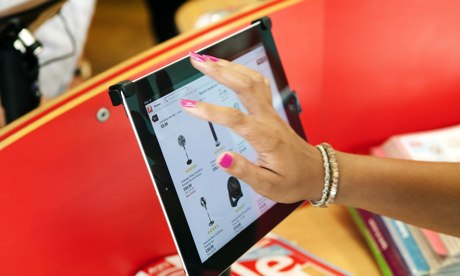
The most startling statistic among Thursday's crop of retail numbers was this: 20% of Christmas trade at Argos came from shoppers ordering via a mobile device; either a smartphone or a tablet. That's from a standing start in May 2010, when Argos first launched an iPhone app.
On some days and weekends close to Christmas, reports Terry Duddy, chief executive of parent Home Retail, orders via mobile devices were running at up to 30% of Argos's total. The peak period was 6pm-7pm, suggesting the modern breed of customer has half an eye on the TV while shopping on a tablet.
For Argos, where 46% of total sales now come via the internet, this shift in habits has delivered something close to salvation. A couple of years ago Amazon seemed destined to flatten Argos. It hasn't happened because the rise of tablets has gone hand-in-hand with the increase in collect-from-store services. Typically, customers will collect orders from Argos within an hour or two, or the next morning.
The Amazon streamroller will trundle on, of course. But the trend illustrated at Argos explains why the internet giant is scrambling to secure collection points in London tube stations and elsewhere, while also indulging in fantasies like delivery by drone.
Warmer breezes have come too late for the likes of Comet and HMV. But the survivors among specialist retailers, it seems, are no longer doomed to die at the hands of Amazon or Tesco's out-of-town megastores.
This cheery conclusion is supported by Thursday's trading numbers. Dixons, for which obituaries were being prepared in 2011, saw like-for-like sales rise 5% in the UK and Ireland, which it thinks represented a gain in market share. It is a beneficiary of the demise of Comet, but the other half of the story is sharper pricing, imposed on it by the internet, and investment in better customer service, for which there is clearly still a demand.
Halfords' revival – sales up 6.6% in the Christmas period – has followed a Dixons-like path. Its gadget boom is the huge increase in cycling, and there was a similar recognition that training staff was a necessary investment. All of which has provided some remarkable turnarounds in share prices. Home Retail's have advanced from 80p to 200p since summer 2012. Halfords' have travelled from 200p to almost 500p in the same time. Dixons' have quadrupled since Christmas 2011.
Among that trio, only Halfords' shares stand even remotely near an all-time high, it should be added. Home Retail, even in revival mode, is a substantially less profitable business than it was. In 2007-08, profits were almost £400m; yesterday it said it expected this year's outcome to be towards the top of the City's £90m-£109m range. But the three retailers can credibly claim to be competitive again.
Debenhams doubts
After Mike Ashley's fast shuffle out of Debenhams' shares, and into the business of writing put options on the stock, the net effect is that Sports Direct will end up with either a 0% stake in the department store group or 6.6%. But that's only if nothing changes in the meantime. When Ashley's around, make no assumptions.
From his point of view, the arrangement makes some sense. He can book a £4.5m profit on the initial purchase and sale of a 4.6% holding while keeping an indirect economic exposure. His only real risk comes if Debenhams' shares collapse.
The clever-clogs manoeuvre may also be designed to remind Debenhams' board that he's around, plotting, and deadly serious about wanting to discuss some form of trading deal.
But the advice to Debenhams' board remains the same. Only sign a deal with Ashley if it demonstrably makes sense for Debenhams and can be justified to shareholders.
It doesn't matter if Sports Direct's stake is 0%, 4.6% or 6.6%. Any commercial alliance must stand on its own feet.
For the time being, Ashley and Sports Direct have no voting rights whatsoever at Debenhams. The board should remember that fact when the two sides meet next week to talk about a tie-up as, from outside, it remains hard to see where the mutually beneficial crossover between Debenhams and Sports Direct is meant to be.
In the midst of complexity, the department store group should try keep matters simple.

